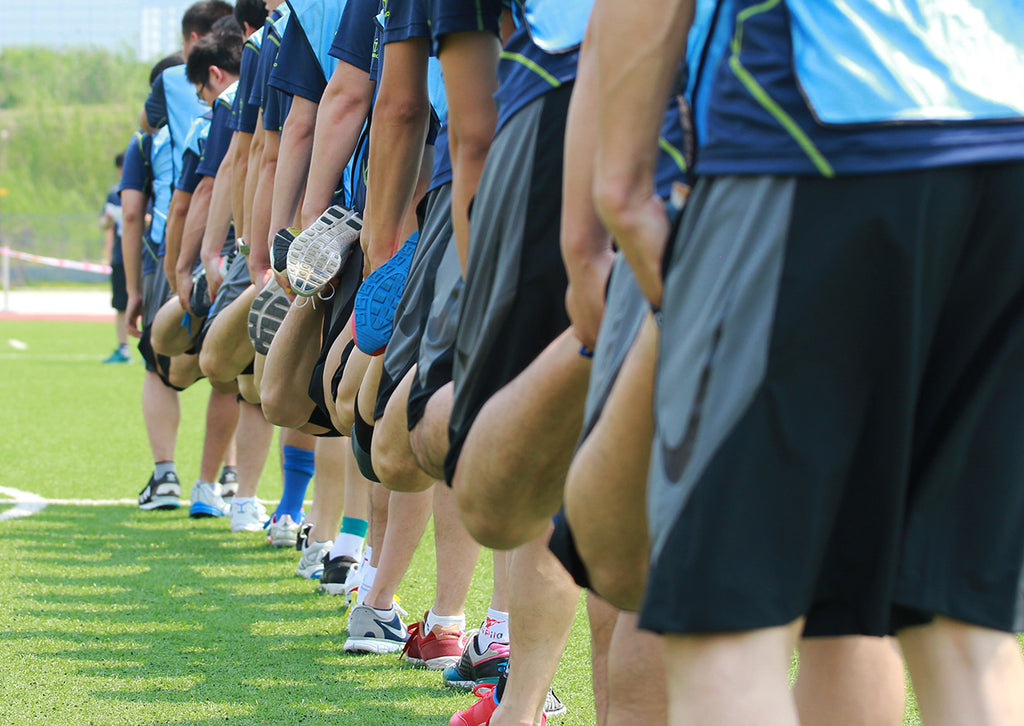Luís Estrela
The Importance Of Technical Coordination In Training Groups
Today, a club’s Technical Coordination is the primary tool that allows the guidance of a training process in an organised, planned and structured manner, from its starting point and passing through all stages of development until the point that the club has established as the final phase of the process of training its players.
In the training groups, we very often see the coach working in a disconnected manner, with his own particular ideas, training methods and ways of thinking. The great responsibility of those tasked with Technical Coordination is, initially, to do away with the idea of an individualised training process using tiers and to introduce an overarching way of thinking among all parties, which enables daily interconnection in the sporting structure in furtherance of a common final goal, previously established by applying all the tools at its disposal in this regard.
For the sports project to be sustained in the medium term, firstly it is necessary for there to be interconnection between the tiers of training and the club’s senior team, so that the whole process is in symbiosis, with the technical coordinator managing to describe and operationalise the training principles, basic elements and actions that our players should acquire during the training process.
The Sports Training Model is developed in practice through the essential work of planning, in which the Technical Coordinator will determine which Playing Model of Training Futsal the Club will use, structuring for each tier the behaviours, objectives, rules, essential elements, individual actions and combinations to be acquired in each zone of the field, and which principles and sub-principles comprise our way of playing. This way, the stages of development of each tier are interconnected, the complexity of their contents increasing gradually, and they are operationalised in training through Training Units structured following the pre-established criteria and with content outlined in advance by the Technical Coordination.

The Technical Coordinator should carry out daily monitoring of the coaches’ work, drawing up reports on their training units, technical coordination reports on the performance of the coaches during matches and meeting weekly with all of them individually, working on what was observed and what should be improved.
The teaching component of the coach, the way of intervening during training, the relevance of the exercises given in training, the quality of the session performed, the intensity of the training, feedback, the environment during the session, the collective process of the teams and the individual evaluation of the players are clearly all points of particular note.

It is very important for the coach to review the match report, which clearly covers important points such as organisation of the defence, organisation of the attack, tactical systems, points of superiority and inferiority, 5vs4, cross-referencing the information that the coach provides with that which the Technical Coordinator observed in the match context, and finding ways to improve the match processes, while at all times taking a constructive approach.
In order for all the training dynamics to be received positively, the process should be open to all coaches, who should contribute in a natural way, thus ensuring that the coaches observe different training processes between each tier. In order for there to be an interactive dynamic, information accessible to all and a platform that allows the technical coordinator remotely, at the click of a button, to access all the information on his training tiers, it is essential to build an easy access drive space, where the coaches can enter all information required. These data may thus be consulted at any time, extremely quickly and efficiently. For example, on the actual day of the training, the Coordinator may consult the Training Unit of the tier he is going to observe, checking in real time the proposed content and the relevance of the session.
The Technical Coordinator should create folders where he can quickly consult the annual, monthly and weekly training plans, the respective training units, the records of attendance, the squad, player evaluation sheets, collective match reports, individual match reports, trial player evaluation sheets and other sets of information that it is deemed appropriate to supervise.

One very important point has to do with the management of the transition plans of our players, it being crucial to determine in advance that the players do not belong to any one Coach, but are rather club players, and it is the responsibility of the Technical Coordinator to evaluate the sporting performance of the players, determining which training and competition is most suitable in order to make progress on a daily basis.
To ensure his plan is structured, the Coordinator should manage each player’s transition plans for moving up or down tiers, carrying out a daily evaluation, requesting after 15 days of training the Coaches’ reports the on those players and seeking to ascertain the success or otherwise of their actions in a sporting context in order to best ensure the player’s progression.
Under the ambit of recruitment, the technical coordinator will need to create his own scouting team, adding information to his database through a series of strategies, such as including in the weekly report a space for the coaches to enter information on the best players in the opposing team, conducting open days, networks of contacts, observations and recruitment initiatives in schools.
Very important in terms of Technical Coordination will be the design of an Exercise Workbook from the Training, which reflects the intended training methodology to be applied. In order to be applied correctly, technical coordination meetings should be held in advance with all Coaches, so that the content of the training to be conducted can be specified for each tier, thus organising the correct progression of the content for all tiers. By doing this, all coaches can be involved, and they will feel they play an active role in the process, we develop the group team dynamics, we allow the Coaches to present their training proposals for each content chosen in the respective tier, and it is the responsibility of the Technical Coordinator to streamline all this teamwork and finalise the final document into the Training Exercise Workbook.

This document should convey the entire intended training methodology to be implemented in the development of our players, including the contents of training appropriate to the stages of development of each tier, providing the tools necessary for the players to develop from tier to tier, gradually.
The final objective of the training process will be for the players to identify fully with the Playing Model of the senior team, acquiring throughout their training the elements necessary to compete successfully and master the behaviours desired by the Coach.
Investment in the ongoing training of the coaches is crucial, and the Coordinator will be responsible for encouraging all coaches to improve their coaching level, and should at all times provide various training sessions that encompass the training process. In this regard, I clearly emphasise training sessions that include ethics, teaching, training models, playing models, stages of development in training, nutrition, content of training, scouting, team management and other sessions that enrich the performance of the coach’s activity.
The Technical Coordination is inseparable from a permanent link to the coach of the senior team, so that the channels of connection remain active and the process among all the tiers of the club remains synchronised. The day-to-day work of the Technical Coordinator with the coach of the session is the secret for developing both, thus the Coordinator should monitor the entire training process and find ways to develop his Coach in all aspects inherent to his function.
A club without effective technical coordination is unlikely to possess a high-quality training process. If we wish to invest in the training of our players, we must think about our club’s sporting project, how we wish to train our players and find ways to carry this out with consistency and quality.

7 KEY POINTS OF TECHNICAL COORDINATION IN THE TRAINING TIERS
- The Technical Coordinator is the “Guardian of the Training Provider”, the club’s sporting policy and responsibility for implementing the strategies, processes and activities that determine his Vision of the club falls on his shoulders;
- Definition of a Playing Model, Strategic Plan, Basic Playing Concepts and implementation of activities related to technical development, monitoring and pedagogical technical evaluation of the Training Provider;
- Being a channel of communication between all members of the club;
- Respecting the player’s stages of development, adapting his level of maturity to the work group and taking an overview of his future, and not his immediate potential.
- The level of behavioural demands is established and consistent for all involved;
- There is a positive relationship of trust between the coordinator and the coach;
- Tasks and duties are clearly defined according to competencies;
OTHER IMPORTANT POINTS
- Building relationships and channels of communication with the players’ families;
- Defining, leading the Training Provider’s programmes and strategies;
- Developing a Technical Guidance Document, Training Dossier, Transition Plan and Recruitment and Acquisition document;
- Definition of a Playing Model, Strategic Plan and Basic Playing Concepts that support the sporting vision of the club;
- A Transition Plan that is gradual and balanced for the development of the players;
- Definition of priorities and strategies over the course of the sports season.
- Players classified according to their performance and potential;
- Constant interaction between tiers – Training and Matches;
- Regular evaluations to determine and adjust individual training processes;
- Increasing the players’ volume of training, creating dynamics between tiers.
- Protecting a single identity for the club;
- Being a channel of communication between all members of the club.
- Having a Vision of the Club;
- The coaches having responsibility and capacity to give their opinion in relation to the structure of the process;
- The training space is propitious for them to put forward their ideas without judgment;
- Evaluating the before, during and after in relation to intervention by the coach;
- Definition of a strategic plan for the short, medium and long term;
- Making sport an appealing and attractive service;
- Public sports policy;
- Strategic Planning at the club;
- Guardian of the Club’s Identity;
- Direction is more important than speed;
- Code of conduct for Parents and Coaches;
- Educational, personal and social monitoring;
- Technical Coordinator defines (according to the Vision, Mission and Values of the Club) the regulations and codes of conduct for players, coaches, parents and directors;
- Having an appropriate day to speak to parents, establishing channels of communication, times and place;
- Delegating and holding people accountable for the fulfilment of tasks, establishing clear objectives;
- Initial evaluation of the Club;
- Operationalising and evaluating is the key;
- Interconnection between tiers;
- Planning of the club’s sports season and that of each tier;
- Player-centred training;
- Training of balanced groups;
- The concept of merit must exist;
- Evaluation of the process, the result will be the long-term consequence.
- Stages of Development – Basic Level, Elementary Level, Intermediate Level and Specialised Level;
- Determining a series of guidelines that allow the sporting and social development of young players;
- Training Stages – Development of the Futsal player;

“The only place in the world where success comes before work is in the dictionary”
Albert Einstein



























































Comments
Share your thoughts